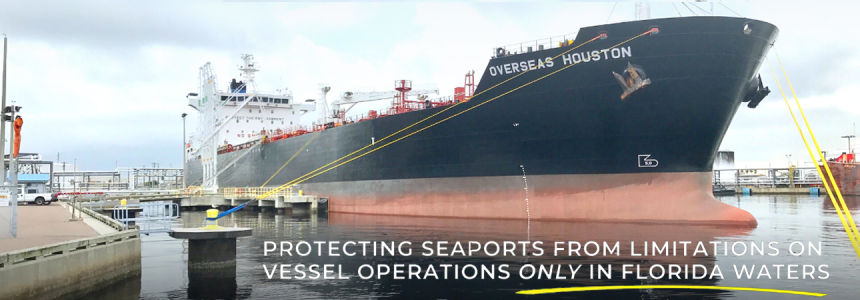News & Updates
President’s Message: June 2023


President & CEO
A newly proposed rule by the National Oceanic and Atmospheric Administration (NOAA) that would eliminate nighttime marine travel and greatly reduce daytime marine vessel speeds has put Florida’s Gulf Coast seaports directly in its bullseye. The rule, which stems from requests by several environmental organizations, including Earth Justice, is designed to protect a new species of endangered whales – the Rice’s Whale.
If passed, this rule will have significant ramifications on Florida’s economy, threaten the public safety of all Floridians, and jeopardize America’s national security. That’s because the rule calls for imposing the most restrictive regulations on one specific vessel navigation area of the entire Gulf Coast region – Florida waters from Pensacola to Tampa Bay.
Vital cargo, including food, fuel and medical supplies, would be unable to travel overnight to call on Port Tampa Bay, SeaPort Manatee, Port Panama City and Port of Pensacola. Moreover, just as the recent supply chain debacle had subsided, Americans should brace for similar delays as a result of the greatly reduced daytime vessel speed restrictions. These restrictions will also impact commercial and recreational fishing vessels.
With Florida importing all of its fuel/petrol for everything from airplanes to cars and commercial trucks that deliver goods and supplies to grocery stores across the state, two of Florida’s four Petrol ports – Port Tampa Bay and SeaPort Manatee – will see the speed of those supplies severely delayed, putting the safety of all Floridians at risk. This will have a particularly negative impact on Floridians during times of natural disasters.
Rice’s Whales were “discovered” about 9 years ago. During that time, there have been two stranding incidents. Necropsy results are not 100 percent clear as to the cause of those two deaths, but one was thought to be related to plastic in the stomach contents.
Science surrounding the origin of the Rice’s Whale is new, and the scientific community is not necessarily aligned in their belief that these whales represent a new species and are limited to only the Northwestern Gulf Coast. In fact, the original interaction with what is now called a Rice’s Whale occurred while a scientist was working on other issues surrounding the Deep Water Horizon oil spill.
Further, because of this new science, NOAA openly recognizes that the reports, studies and findings they used in developing this newly proposed rule as “suggestive,” “limited,” “sparse,” and even “surprising.”
The Florida Ports Council opposes this proposed rule, has submitted a letter and will be submitting additional public comment with NOAA. The proposed rule, along with the petition materials submitted to support the proposal provide a paucity of rationale for such an overreaching rule on Florida’s navigable commercial waters. The proposal to limit vessel operations in just Florida waters also calls into question whether this proposal is based on something other than scientific data.
We have requested that NOAA rescind its proposed rule and take action to work closely with affected ports, maritime industry stakeholders and others to accurately determine the effect any proposed rule would have on ports and port communities.
Thank you for the great work you do, and thank you for your support as we navigate the rough waters ahead on this issue.
